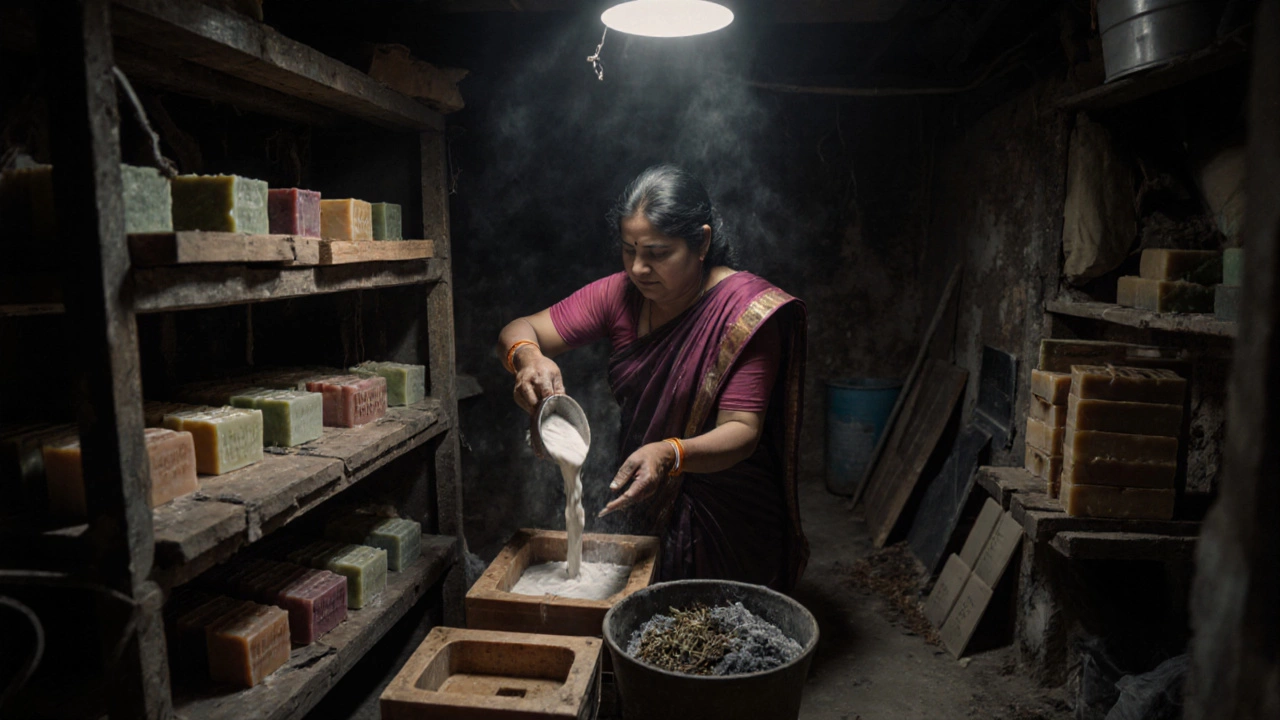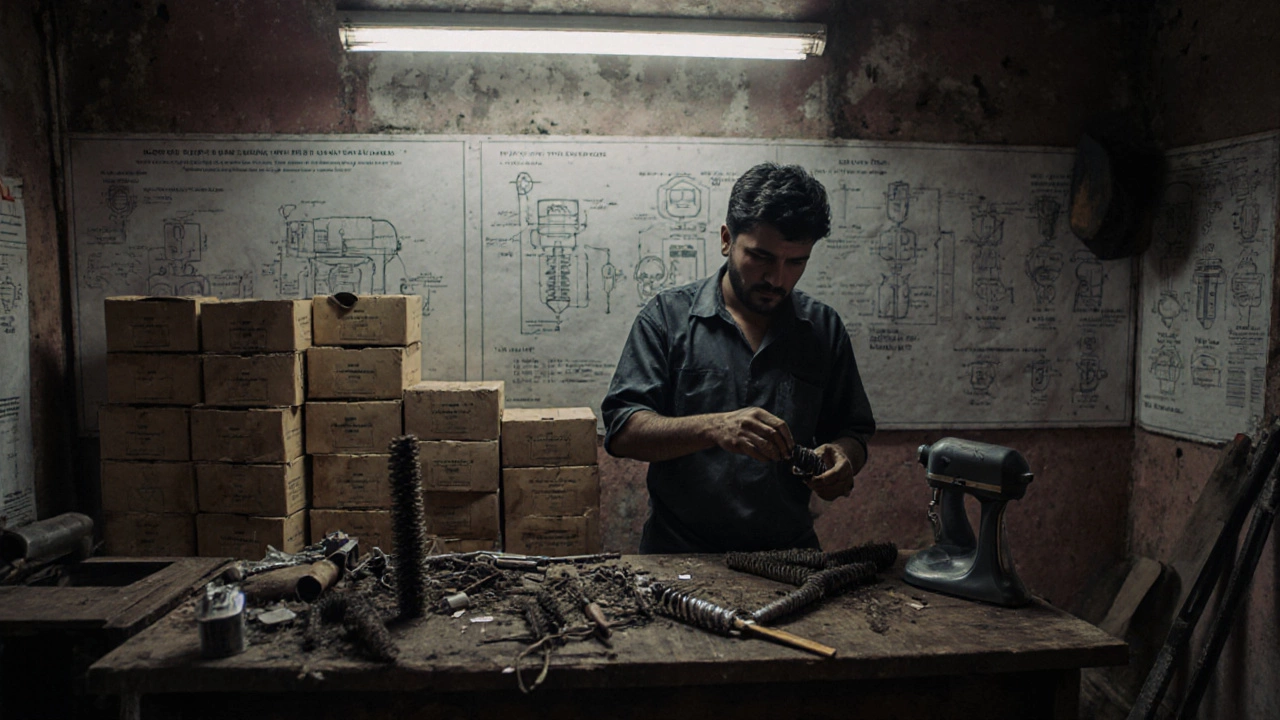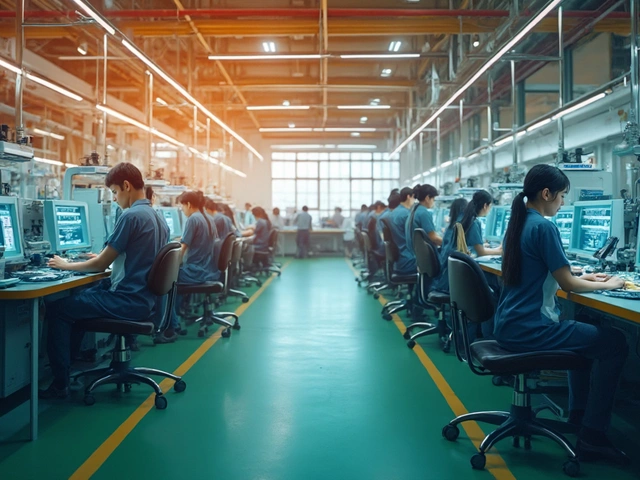Recession-Proof Business Profit Calculator
Calculate Your Potential Profit
When money gets tight, people don’t stop buying-they just buy smarter. That’s when the right manufacturing business doesn’t just survive-it explodes. While luxury brands shrink and non-essentials vanish from shelves, demand for basic, reliable, affordable products spikes. In India, where over 60% of households live on daily wages, recession doesn’t mean less consumption-it means shifting to what truly matters. If you’re thinking about starting a manufacturing business, now isn’t the time to wait. It’s the time to build something people can’t live without.
Essential Food Processing: The Always-Needed Industry
Food is the first thing people cut back on-not the first thing they stop buying. During recessions, families stop eating out, skip premium brands, and turn to affordable, shelf-stable options. That’s where small-scale food processing thrives. Think pickles, papads, ready-to-cook spice mixes, roasted snacks, and fortified atta. These aren’t fancy. They’re practical. And they’re made in kitchens and small factories across Tamil Nadu, Uttar Pradesh, and Bihar every day.
Take the example of a small unit in Coimbatore that started making organic turmeric powder in 2020. With no marketing budget, they sold directly to local kirana stores at 30% less than branded packs. By 2023, they were supplying 400 shops across three states. Their secret? No fancy packaging. No celebrity endorsements. Just pure, tested quality at a price that made sense during inflation.
Start small: buy a basic grinding machine, source local raw materials, and focus on one product. Register under FSSAI (it’s affordable for micro-units). Your customers won’t care if you’re a brand-they care if the spice lasts, the oil doesn’t go rancid, and the price stays stable. That’s the real edge in a recession.
Basic Personal Care and Hygiene Products
When budgets shrink, people stop buying new clothes, phones, or vacations. But they never stop washing their hands, brushing their teeth, or keeping their homes clean. That’s why manufacturing low-cost hygiene products is one of the most stable businesses during economic downturns.
Think soap bars made from coconut oil and ash, herbal toothpaste with neem and charcoal, reusable cloth pads, and concentrated liquid soap that lasts 3x longer than commercial brands. These aren’t luxury items. They’re replacements for expensive branded products people can no longer afford.
In Chennai, a woman started making herbal soap bars in her garage in 2022. She used locally sourced neem, tulsi, and coconut oil. She sold them for ₹25 each-half the price of a branded bar. Within a year, she was supplying 120 local shops and had a waiting list. Her customers weren’t looking for organic certifications. They wanted something that worked, didn’t irritate skin, and didn’t cost more than a bus ticket.
Manufacturing these products requires minimal investment: a mixer, molds, and a reliable supplier for base oils. You don’t need a lab. You need trust. And trust comes from consistency. Make the same soap every time. That’s the brand.
Repair and Replacement Parts for Appliances
People don’t throw away broken fans, mixers, or pressure cookers during a recession-they fix them. That’s created a booming market for low-cost, locally made replacement parts. You don’t need to build a whole appliance. You just need to make the part that breaks most often.
Think of the motor brushes in a ₹1,500 mixer. When it stops working, people don’t buy a new one. They search for a replacement brush. But branded parts cost ₹200-₹300. A locally made one costs ₹40 and lasts just as long. That’s a 5x difference.
In Ludhiana, a small workshop started making replacement parts for common Indian appliances-fan capacitors, mixer gears, kettle heating elements. They sourced scrap metal, used basic CNC machines, and sold directly to repair shops. Within 18 months, they were supplying over 200 repair centers across North India. Their profit margin? 60-70%. No marketing. Just word-of-mouth from repairmen who knew their parts didn’t fail after a week.
If you have access to basic machining tools, start with one part. Test it. Get feedback from local repair shops. Scale slowly. This isn’t about innovation. It’s about reliability.

Low-Cost Furniture from Recycled Materials
When people move to smaller homes during financial stress, they don’t buy new furniture-they repurpose. That’s why furniture made from recycled wood, bamboo, and scrap metal is rising fast. You’re not competing with IKEA. You’re competing with broken chairs and rented rooms.
In Bangalore, a group of carpenters started making foldable study tables from discarded plywood and iron pipes. Each table cost ₹1,200 to make. They sold for ₹2,500. Parents bought them because their kids needed a place to study. No brand name. No delivery charge. Just a sturdy table that fit in a 10x10 room.
Start with one product: a stool, a shelf, a bedside table. Use waste wood from local sawmills or demolition sites. Partner with local painters who can refinish surfaces cheaply. Sell on WhatsApp groups, local Facebook pages, or at weekly haats. Your advantage? Speed. You can build and deliver in 48 hours. Big furniture brands take weeks.
Water Filters and Purification Units
As water quality becomes a bigger concern-especially in cities with unreliable supply-people are ditching bottled water. They’re buying small, affordable filters instead. That’s where a simple gravity-based purifier with activated carbon and ceramic elements becomes a goldmine.
These units cost ₹800-₹1,200 to build. They last 2-3 years. A family of four spends ₹300/month on bottled water. A filter cuts that to ₹50 for replacement cartridges. That’s a 6x savings. People get it.
In Hyderabad, a small manufacturer started making these filters in 2021. They didn’t advertise. They gave free demos to housing societies. One satisfied customer told three neighbors. Within a year, they were selling 300 units a month. They now supply to NGOs working in slums and small towns.
You don’t need a fancy plant. You need a mold for the housing, a supplier for ceramic filters, and a way to test flow rate. The product speaks for itself. No branding needed. Just clean water.

Why These Businesses Win When Others Fail
These aren’t glamorous ideas. No one’s filming TikTok videos of soap-making factories. But they work because they solve real problems with real savings. During a recession, consumers don’t want innovation. They want reliability. They want value. They want products that don’t break, don’t cost more, and don’t require a loan to buy.
The key to success? Start small. Focus on one product. Master the supply chain. Build trust through consistency. Don’t chase scale. Chase satisfaction. One happy customer who tells ten others is better than a thousand ads.
Also, don’t ignore government schemes. PMEGP (Prime Minister’s Employment Generation Programme) offers loans up to ₹25 lakh for micro-manufacturing units. Many state governments in Tamil Nadu, Karnataka, and Uttar Pradesh offer subsidies for equipment purchase. You don’t need a business degree. You need grit, a good supplier, and a willingness to listen to your customers.
What Doesn’t Work in a Recession
Don’t try to make luxury items. Don’t invest in high-tech automation unless you’re already profitable. Don’t chase trends like smart home gadgets or electric scooters. These need big capital, long payback periods, and customers with disposable income-none of which exist during a recession.
Also avoid importing components. Local sourcing is your lifeline. Imported parts mean higher costs, longer delays, and vulnerability to currency swings. Stick to materials you can get within 100 km. That’s how you stay cheap, fast, and reliable.
How to Start Today
- Identify one essential product people buy every week: soap, spice, filter, repair part, or stool.
- Find 5 local customers and ask: ‘What do you wish was cheaper or lasted longer?’
- Make 10 units. Give them away for free. Ask for feedback.
- Fix the design. Lower the cost by 15%.
- Sell to 10 local shops. Ask them to pay after 15 days.
- Repeat. Scale slowly. Stay lean.
This isn’t about becoming rich overnight. It’s about building something that lasts-through boom and bust. In a recession, the best business isn’t the flashiest. It’s the one people can’t afford to do without.
Which manufacturing business is most profitable during a recession?
The most profitable businesses are those making essential, low-cost goods people can’t avoid buying-like basic hygiene products, food processing items, appliance repair parts, and simple furniture. Profit comes from low production cost, high repeat demand, and minimal marketing. A soap-making unit with ₹50,000 investment can earn ₹1.5 lakh monthly by selling to local shops.
Can I start a manufacturing business with ₹1 lakh?
Yes. You can start a small food processing unit (like spice powder or pickles), a soap-making unit, or repair parts for common appliances with ₹1 lakh. Most of that goes into machinery (grinder, mixer, mold), raw materials, and basic packaging. Avoid expensive equipment. Focus on manual or semi-automatic processes. Many successful units in Tamil Nadu and UP began with under ₹80,000.
Do I need a factory to start manufacturing?
No. Many small-scale manufacturers operate from home, garages, or rented rooms. A 200 sq. ft. space with electricity and water is enough to make soap, spice blends, or repair parts. You don’t need a large building. You need consistent output and reliable quality. The government defines micro-enterprises as those with investment under ₹1 crore-many fit in a single room.
What government schemes support small manufacturing during recession?
The Prime Minister’s Employment Generation Programme (PMEGP) offers loans up to ₹25 lakh with 25-35% subsidy for general category applicants. State schemes like Tamil Nadu’s ‘Tamil Nadu Small Industries Corporation’ (TANSI) offer equipment subsidies. Also check PM Kisan Samman Nidhi for rural entrepreneurs and Udyam Registration for easier access to credit. These aren’t handouts-they’re tools to lower your startup risk.
How do I find customers without advertising?
Start locally. Visit kirana stores, repair shops, and local haats. Offer samples. Ask shopkeepers to sell on consignment. Use WhatsApp to reach housing societies and local groups. People trust recommendations more than ads during a recession. One satisfied customer telling five others is better than a ₹50,000 Facebook campaign.
If you’re ready to start, don’t wait for the perfect idea. Start with the simplest thing people need every day. Build it well. Keep the price low. Deliver fast. That’s how you turn a recession into your advantage.





